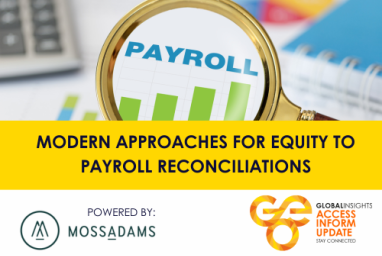Following the SEC's T+1 stock settlement compliance date of May 28, 2024, companies are under pressure to ensure timely share issuance within 24 hours of vesting or option exercises. Failure to manage this process effectively could result in errors, fines, and dissatisfaction among employees.
In a webcast sponsored by Moss Adams, the importance of efficient data transfer between equity programs and payroll systems to support this regulatory mandate was discussed in detail.
Challenges in reconciliation controls
Tim Oakes, a seasoned partner at Moss Adams with over 25 years of industry experience, underscored the critical role of robust reconciliation controls in equity processing. Without adequate controls, errors could slip through the cracks, leading to severe consequences.
Jesus Renteria, an equity compensation professional, highlighted that inaccuracies in data transfer between systems could result in erroneous tax reporting. Such errors not only incurred tax-related fines but also tarnished the employee experience, necessitating corrective actions such as adjusting tax amounts.
Benefits of reconciliation processes and reporting
A dependable reconciliation process ensures that records remain complete and accurate, even when dealing with multiple payroll systems and file formats.
By preventing errors such as incorrect tax calculations, robust reconciliation processes playa vital role in maintaining compliance.
For instance, the IRS mandated that companies deposit taxes exceeding $100,000 within a business day, failure of which could result in penalties. Timely reconciliation of payroll and equity data thus helps companies avoid such fines and stay compliant.
Pros and cons of common reconciliation tools and approaches
Various tools and approaches exist for equity payroll reconciliation, each with its own set of advantages and disadvantages.
- Spreadsheets - widely used for their flexibility and ease of use, but prone to human error and inefficiency with large datasets.
- Automation scripts - effective in automating repetitive tasks and reducing errors, but requires programming expertise for creation and maintenance.
- Custom applications – tailored solutions that offered high accuracy and efficiency, albeit with higher upfront costs and longer implementation times.
Jesus illustrated the effectiveness of automation scripts in streamlining the reconciliation process, especially in complying with the T+1 settlement rule. However, he also noted that the suitability of scripts depends on the specific needs and capabilities of each company.
The importance of accurate and timely tax deposits
Failing to make timely and accurate tax deposits could lead to significant penalties. For instance, if a tax deposit was late by 1 to 5 days, the penalty could be as high as 2% of the unpaid amount. The T+1 requirement further complicates deposit processes, underscoring the critical need for adherence to deadlines.
Equity record keeping and payroll reconciliation
A thorough understanding of the interaction between various systems is indispensable. The equity record-keeping system, managed either by a broker or an internal service, serves as a linchpin, connecting with HR systems, brokers, tax services, and other stakeholders.
Reconciliation between these systems, particularly between equity records and US payroll, involves ensuring consistency across various fields such as year-to-date compensation and tax withholdings.
Challenges and solutions in payroll reconciliation
Reconciling payroll data can be intricate, particularly when considering factors like unemployment and disability insurance, local taxes, and international mobility taxation.
To address these challenges, companies may adopt various reconciliation approaches:
- Spreadsheets - despite their widespread use, they are prone to errors and may not be suitable for complex or large-scale reconciliations.
- Scripting tools - offer automation and handle larger data volumes effectively, reducing manual effort and ensuring consistency.
- Purpose-built applications - provide robust solutions tailored to specific needs, though they entail higher initial costs and complexity.
Introducing a purpose-built payroll reconciliation solution
Moss Adams' purpose-built payroll reconciliation solution allows for flexible data ingestion and customization of business rules, promoting accurate and efficient reconciliation.
The system supports automatic file imports and user permissions, with detailed error reporting and automation features to streamline the reconciliation process.
In conclusion, accurate tax deposits and reconciliation processes are indispensable for compliance and employee satisfaction.
Whether through spreadsheets, scripts, or purpose-built applications, companies can navigate equity payroll reconciliation confidently, leveraging Moss Adams' knowledge in the field.
Contact Tim or Jesus directly for more information and to arrange a demo of their custom application for equity payroll reconciliation.




